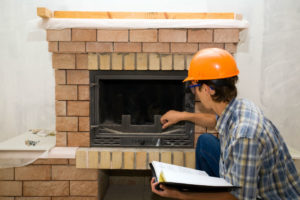Natural gas appliances burn cleanly and efficiently, putting off little smoke or particulate matter. Unlike wood stoves, they don’t lead to a buildup of creosote in your chimney. The cleaner nature of gas appliances is a large part of what makes them so popular. It also can lead people to assume that they don’t need to call in their chimney sweep annually to clean and inspect your chimney, but gas fireplaces and stoves require regular cleaning and maintenance, too!
Clear chimney blockages
It’s true that chimneys to gas appliances won’t become clogged with soot or creosote the way that chimneys to wood-burning appliances do. However, there are other reasons that an annual sweeping and inspection is crucial for chimneys to gas appliances. Your chimney can become clogged by more than just soot. Birds can nest in chimneys, and animals seeking a warm place during cold months can crawl into chimneys and become trapped. Twigs, leaves and other debris also can form blocks in chimneys. A blocked chimney can force deadly carbon monoxide back into your home, or it can ignite and lead to a damaging chimney fire.
Spot any problems
The National Fire Protection Association recommends that all chimneys are swept and inspected each year to prevent against dangerous chimney fires. A chimney inspection ensures that there are no cracks, fire damage or other problems with your chimney. Any time there’s damage to your chimney, your home is put at risk of a fire or carbon monoxide poisoning.
With a gas stove or fireplace, there are many parts that need to be inspected regularly to keep your appliance working safely. Valves and connections can develop leaks. Pilot lights, thermopiles or thermocouples can malfunction. It’s important to have a professional inspect all of these things annually because a malfunctioning gas appliance can lead to carbon monoxide leaks, gas leaks, bursting glass doors and even explosions.
Keep your stove or fireplace running efficiently
Your gas fireplace or stove can get clogged by dust and other debris. The gas logs break down over time, and can crumble into pieces that block fireplace or stove vents. A water-damaged chimney will crumble and can send debris tumbling into your fireplace or stove. If vents or other components in your gas appliance are blocked, that compromises the ability of your stove to operate as efficiently as it can. When you have your annual cleaning and inspection, your technician will clear any debris from the fireplace and vents, remove dust from the gas logs and make sure your gas logs are positioned ideally in the fireplace. Dust and debris also will be cleaned away from the glass doors so you can enjoy the view of your fire.
While gas fireplaces and stoves are much cleaner than wood-burning appliances, your gas fireplace or stove needs to be cleaned and inspected annually, too! If your gas appliance is due for a cleaning and inspection, call FireSide Hearth & Home to schedule an appointment today.



